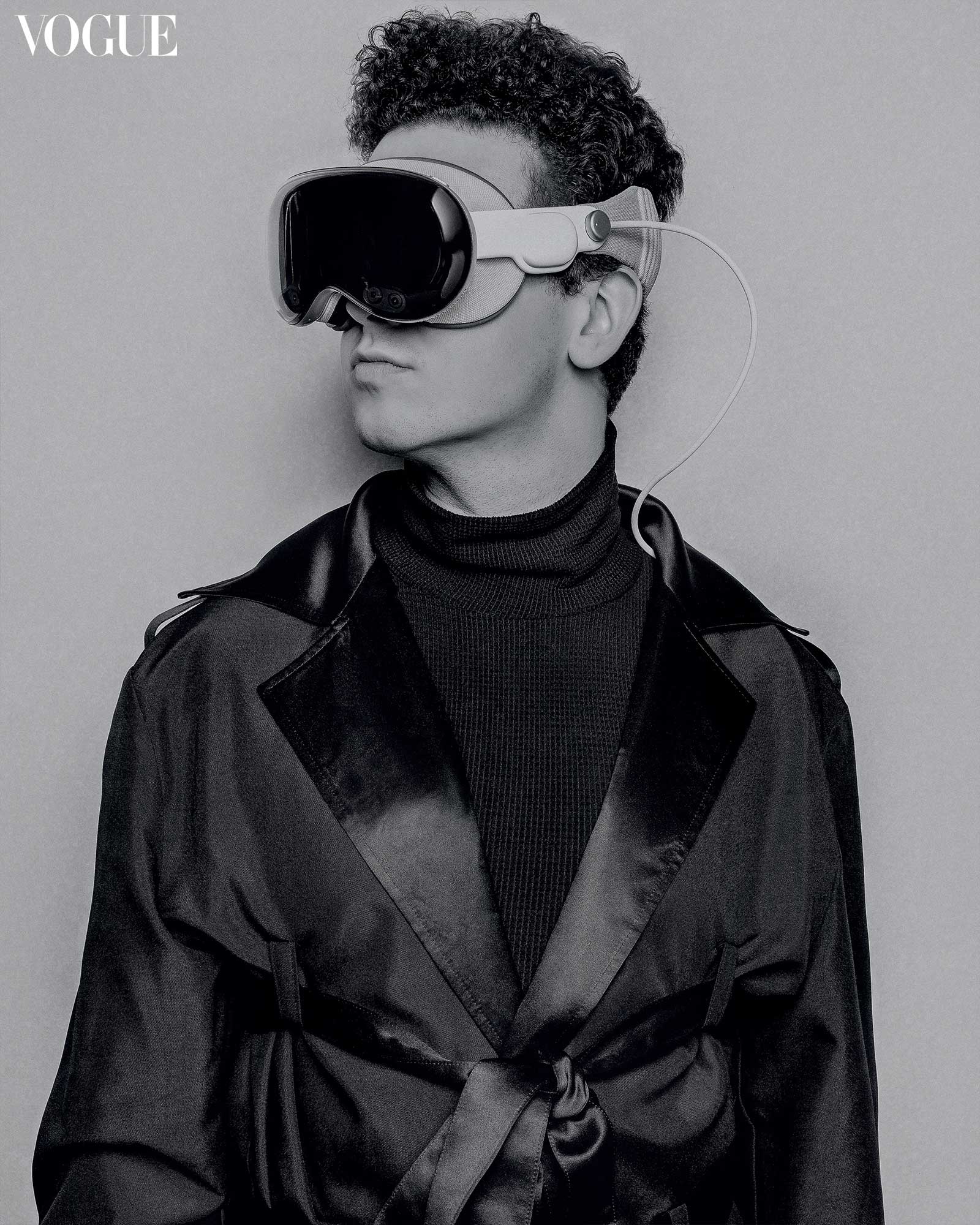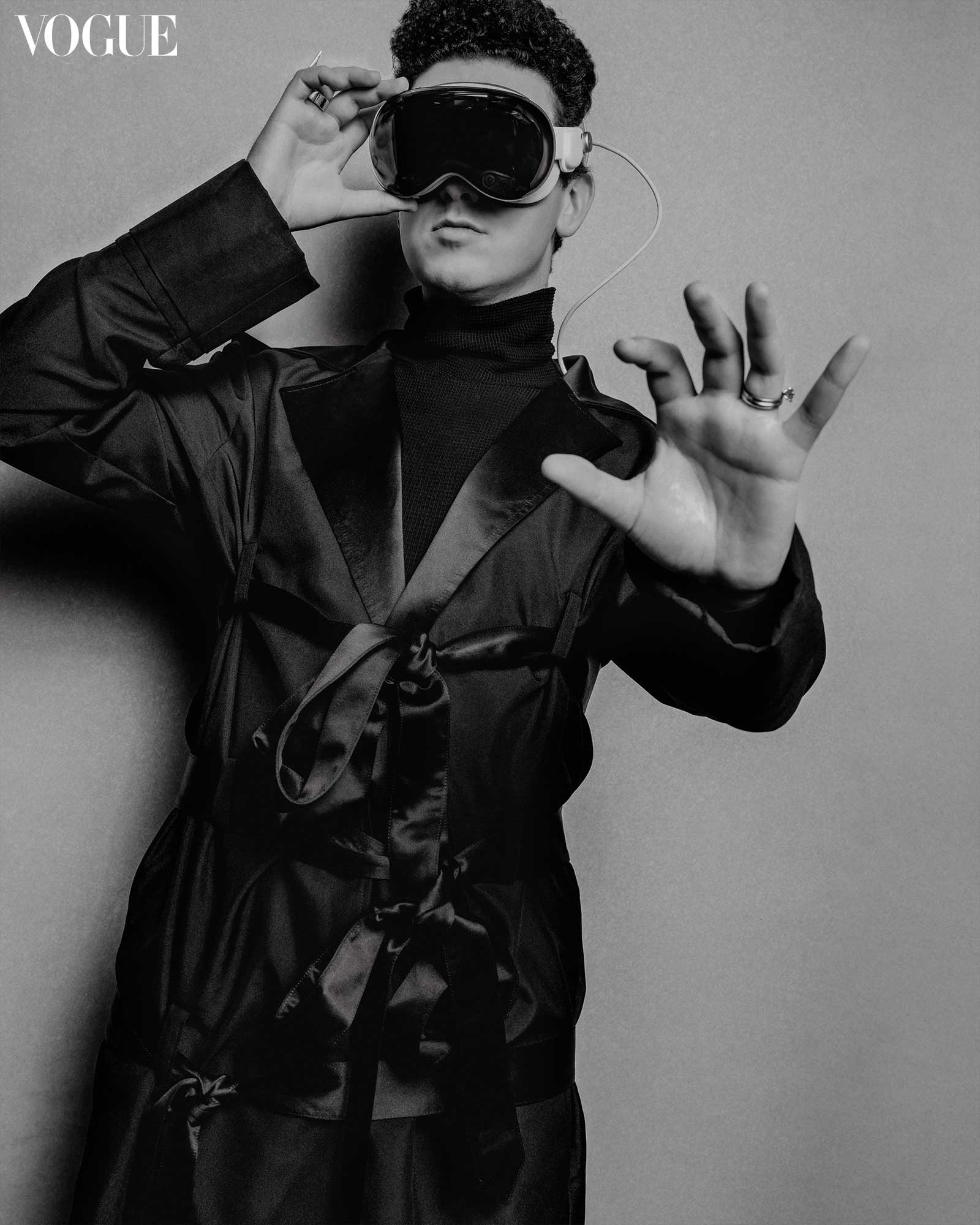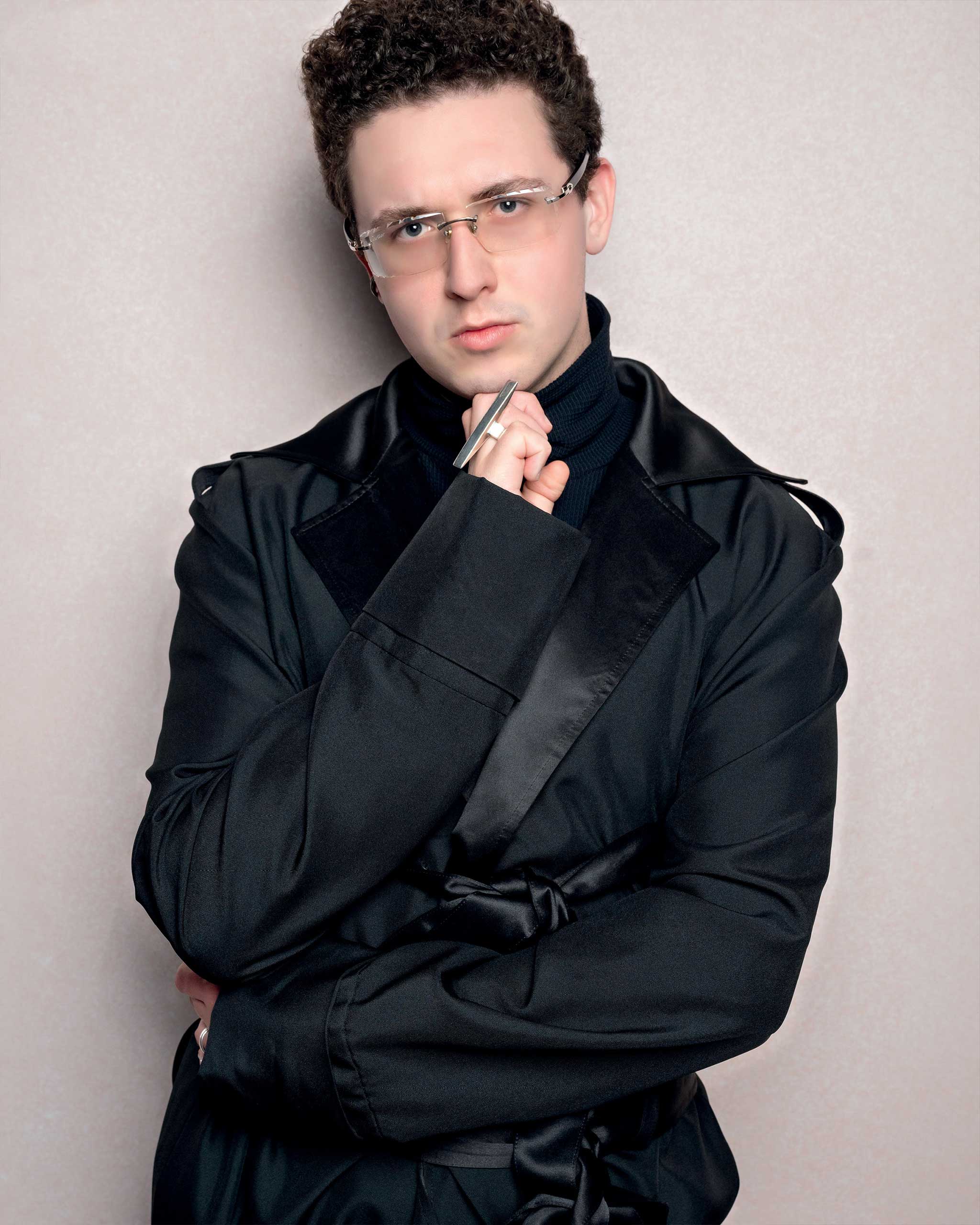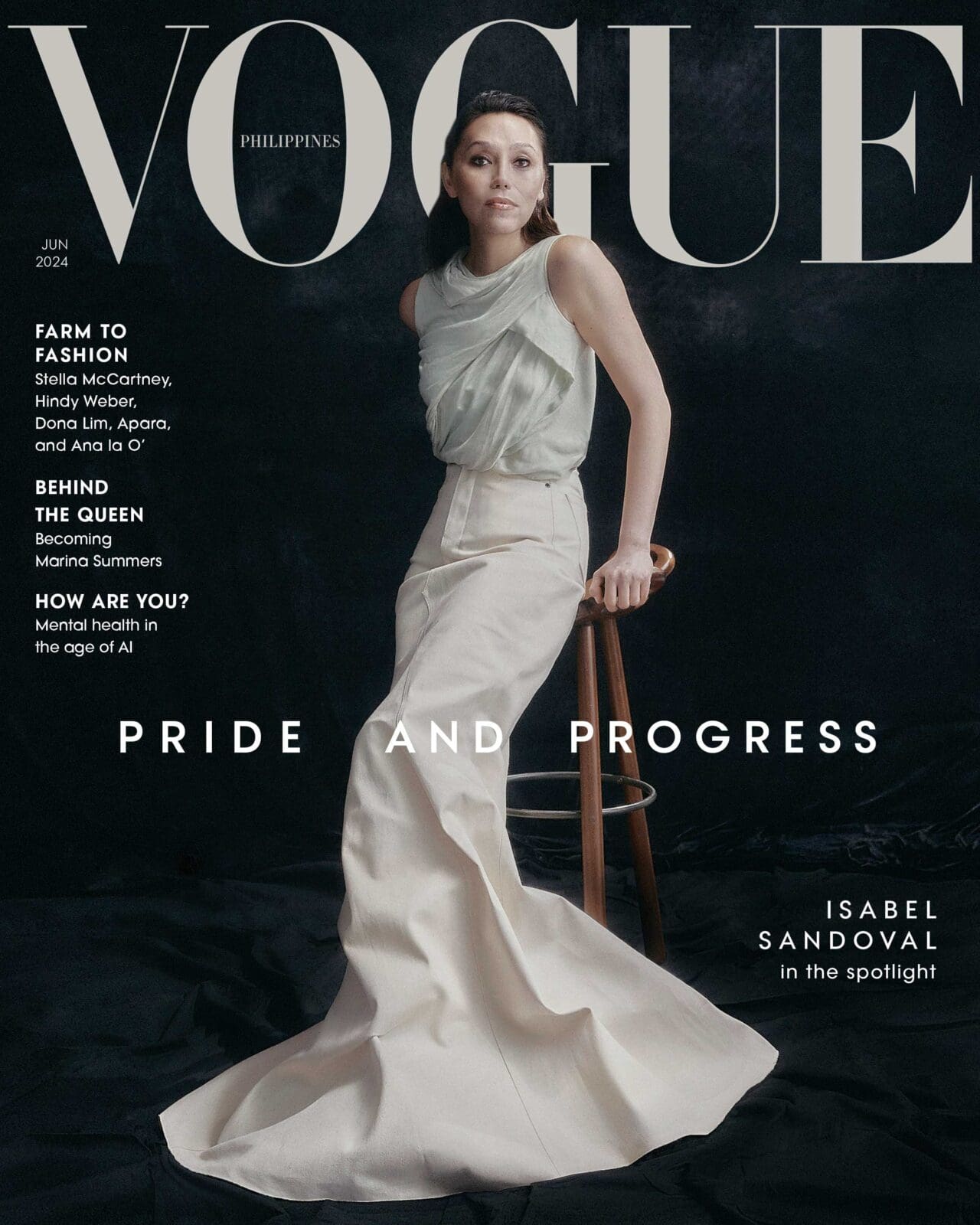L’UOMO STRANO jacket. Photographed by NANCY KIM of NSBKIM
It’s David Cash’s metaverse, we’re all just living in it.
David Cash pivots with such frequency, he’s like a compass magnetized to align with true north, and north, in his field, is a goalpost that just keeps accelerating. He even talks at a pace that leaves normies in the dust, spilling out discursive answers that would be stacked with hyperlinks if his sentences were to be digitized. The self-described polymath is also a prodigy: he started in the industry at a young age as a child actor, eventually making his own films before he was a teenager. This led to a stint at a venture capital firm working as a media director developing short form content, but he would soon strike it out on his own, founding one of the first influencer agencies in Toronto, and David Cash Studios, where he directs and produces experimental web films, music videos, fashion events, and more.
When the pandemic put a halt to entertainment and events, Cash decided to go back to school to get a master’s degree at Polimoda in Florence, focusing on luxury fashion. In early 2021, his master’s thesis, a prescient document on NFTs and Decentralization written in the nascent days of non-fungible tokens, was uploaded to the web, and the rest is viral history. The early NFT adopter suddenly became an in-demand consultant. Cash then started Cash Labs, a Web3 agency that has since worked with companies like Amazon, Farfetch, Next in Vogue, and Estée Lauder in two distinct streams—digital transformation and strategic communications, onboarding brands and their customers to the metaverse via digital wearables and on-chain collectibles, virtual spaces, and gamified experiences.
Style-wise, Cash is also an enigma. The lead curator of the inaugural Metaverse Fashion Week 2022 appears on panels in the avant-garde black suits of the tech futurist, or on Fashion Week carpets in fantastical couture, like the sculptural forms of designer Mario Fugnitto. When he accepted the Fashion Innovation award at the Canadian Arts and Fashion Awards last October, he sparkled in a silver Fugnitto creation worn with silver thigh-high boots. “I am here to represent the future,” he told the audience. Calling in from Canada, David chats with Vogue Philippines about health, hypermodernity, and the future of humanity.
Your master’s thesis, which propelled your career as an NFT evangelist almost overnight, was published in 2021, but so much has changed since then in terms of technology. What would you say have been the major shifts?
When I was writing my master’s thesis, I wrote it very much within the context of when I was writing it, even to the effect that I kept changing dates in the thesis itself. Because all these technologies move so quickly, and things change on a daily basis. As I was researching, the amount of content that was coming up, and watching the search results go from maybe a few thousand results to hundreds of thousands to millions of results over the course of a few months, really showed me how quickly all this was developing.

The entire NFT boom, the advent of the metaverse, the idea of AI, and the idea of spatial computing within the mass market sphere have all been introduced within the past four years. And the curve is exponential. And it’s going to continue to do that because of a phenomenon that I love to talk about and I’m writing a book about, which is called hypermodernity. Hypermodernity is essentially this phenomenon that technology is developing at a rate that makes it difficult for humans to understand.
Cash Labs, my company, is only about three years old, and so much has changed across the board and that’s why I’ve shifted the way that I speak about what I do. I’m very reactive, I like to see how things are going and be true to the nature of what I’m doing. We’re very good at making these new technologies accessible and attainable and understandable to people, and then integrating those definitions and our understandings of these technologies into practical use cases for brands for companies, for enterprises, for individuals for real use cases. Even though NFTs as a hype term or as a marketing activation is no longer as relevant, I still fundamentally believe in everything that I was and am pushing in terms of use cases for brands.
Speaking of AI, which is dominating the conversation now, how do you integrate and enfold that into your work?
I think of AI as completely separate from the Web 3.0 conversation. Is it a piece of the next era of the Internet? Absolutely. But like, how many numbers can we put after Web until it gets ridiculous? I think AI kind of lives off to the side. AI is just the improvement of all the things we’ve had—it’s not a new thing, it’s been something that has been developed since the ’70s or ’80s.
In terms of our work and how we leverage AI, we use it for a lot of different products but I don’t call us an AI agency in any respect. That’s why we took this moniker of Innovation Agency. Most of our processes on the back end of our company are automated, and anything that we can automate, we automate because the tools are there, so we might as well use them.
Like, I also write and if I’m writing an article for Vogue I’m not having AI write that article for me, that’s unethical. But there are parts of the process that I might leverage AI for, such as a transcript of this interview, because I have a little AI that’s recording it right now. So that’s really how we use it, for incredibly practical purposes.
There’s still a lot of debate and fear over AI taking over humanity. Do you have any concerns yourself?
I think it’s really about pushing the positive use case and the positive narrative around these technologies. How can we use these to our advantage? How can we facilitate the use of these technologies and these evolutions of AI technologies to society’s advantage? And then how can we negate and remove and make less accessible any use cases of this technology that could be detrimental to society? I really feel that pushing and focusing on the positive narrative and viewpoint of this is not just utopic and blind to the alternative, it’s actually necessary for us to move in the positive direction where there isn’t some dystopian view. Because if we all collectively work to create this utopian view of it, we will have it, but if we all collectively agree that this is going to be a dystopian technology, it will be.
We’re also not really ready yet for what it’s about to unleash.
That’s a very fair thing to say because I think, per hypermodernity, we’re going to be less and less ready as all these technologies continue to develop. It’s the same reason why maybe I can relate more to somebody my parents’ age than I can relate to a 13-year old kid right now, even though the 13 year old kid is only like 15 years younger than me, and my parents are 30, 40 years older than me. The difference in terms of our understanding, especially technological understanding are vast and the lexicon of a preteen or a teen these days is completely different than mine. That’s yet another example of the rapid development of technology and how it’s affecting our society and our culture. So, to your point, we’re not ready for it.
There are definitely things that we can do to better prepare and embrace these types of things. It’s being inquisitive, being open and trying and learning, but I don’t put the onus on all of us. I love my Apple Vision Pro, I’m excited about it because I’m nerdy and have been excited about the idea of spatial computing for a long time. And I’m quite ADD so I like doing a lot of things at the same time. So it works really well for me, though it might not work as well for somebody else. That being said, if you get really invested or interested in any of these technologies, there’s a lot you can do with that. I’m not saying that everybody has to go and do a master’s thesis on NFTs. I actually do put a lot of the onus on brands, on media publications, on educational systems, on schools, on governments, to actually start integrating positive use cases of all these technologies into our lives and making them more accessible.

On a personal level, since you deal with so much tech and you’re always in the digital space, how do you plug out and bring things back to the “real” world?
Given my definition of the metaverse, I’m essentially in the metaverse right now—we are connecting through a digital platform at the same time and place in this Google workspace situation and we’re surrounded in this gray box. I definitely need to disconnect from this several times a day, every single day. I’ve gone through a big journey and there were some points in the past three years where I was working 24 hours a day, working crazy hours and on my computer all the time and I burnt out a few times in this process.
It’s also worth mentioning in the context of this is that I’m a two-time cancer survivor. I’m only 28, but I’ve unfortunately been diagnosed with cancer twice, I’ve gone through chemo, I’ve had two different surgeries. Luckily, I’m fully in remission. I’m totally fine and I go to the gym every day. But I do take a lot more care in my physical wellbeing and mental health and physical health. And so every single day before I log on to the metaverse, I always try to make sure that I leave the house, that I walk my dog or interact with my dog in some way and go outside. I do, I have a workout routine. Every morning I do a whole yoga and meditation routine before I even touch my phone.
My phone, laptop, and now in my workflow, my Vision Pro are very much my office even more than my physical office. If I’m traveling and running around, these three devices are the world that I do my work in, and I have to think of how to check out of my office, as in my digital environment.
What about writing, how do you find the time and space to work on your book?
That’s probably the hardest thing, if I’m being perfectly honest. I’d say the easiest time for me to plug out of my business world and plug into that world is when I’m on a flight. Anytime I’m on a flight and there’s no Wi Fi, that’s usually when I get a really good writing session in and that happens relatively often for me. So after waking up from a nap I have a good eight hours just sitting there and I usually do a pretty hardcore brain dump session and then just try to contextually make sense of it later.

